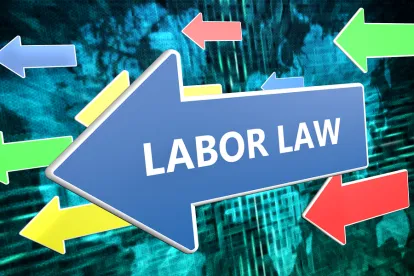On April 11, 2020, Virginia Governor Ralph Northam signed nearly two dozen bills into law, many of which will have a significant impact on employers, employees, and the broader Virginia workforce. The Virginia Values Act (Senate Bill 868) (“Values Act”) amends the Virginia Human Rights Act (“VHRA”) to, among other things, add sexual orientation and gender identity as protected characteristics and greatly expand the scope of the VHRA’s coverage.
While the extension of anti-discrimination protections to Virginians on the basis of sexual orientation and gender identity has garnered the most media attention, Governor Northam also signed numerous other bills that provide additional protections against workplace discrimination, aim to prevent worker misclassification and wage violations, and limit the use of non-compete agreements. As we previously reported, these bills collectively will usher in extreme changes to employment in the Commonwealth of Virginia.
Each of the signed bills will become effective on July 1, 2020.
Amendments to VHRA: Sexual Orientation, Gender Identity, and Lactation Protected
By enacting the Values Act, Virginia becomes the first state in the South to prohibit workplace discrimination on the basis of sexual orientation and gender identity. In addition to providing additional protections to LGBTQ individuals, the Values Act also makes these key changes to employment discrimination law in Virginia:
-
Expansion of coverage. Whereas the prior version of the VHRA covered only those employers with between five and 14 employees, the Values Act expands coverage of the VHRA to all employers with 15 or more employees. Additionally, for purposes of unlawful discharge claims due to alleged discrimination (other than age), employers with more than five employees are covered. In cases of unlawful discharge based on alleged age discrimination, the amended law applies to employers with more than five but fewer than 20 employees.
-
Public accommodation discrimination banned. The law now expressly prohibits discrimination in public accommodations on the same grounds as the VHRA, including on the basis of sexual orientation and gender identity.
-
Private right of action created. The Values Act creates a private right of action under the VHRA for the first time. Plaintiffs may be entitled to compensatory and punitive damages, reasonable attorneys’ fees, and various equitable relief.
-
Expanded powers granted to Virginia authorities. The Values Act grants expanded powers to the Virginia Division of Human Rights, which has now been given the authority to investigate charges of discrimination and issue determinations as to whether reasonable cause exists. In addition, the Values Act vests the Attorney General with the authority to initiate a civil action on behalf of an employee to seek preventive relief and monetary damages.
By signing House Bill 1049, Governor Northam ensured that prohibitions against sexual orientation and gender identity would be carried through a number areas of law, including public employment, public contracting, public accommodation, apprenticeship programs, housing, banking, and insurance.
Governor Northam also signed into law House Bill 827 and Senate Bill 712, identical bills that require employers to make reasonable accommodations for the known limitations of an employee related to pregnancy, childbirth, or related medical conditions, unless the employer can demonstrate that the accommodations impose undue hardship on the employer. The bills define “related medical conditions” to include lactation, and employers may be required to provide breaks to employees to express breast milk and/or provide access to a private location other than a bathroom for the expression of breast milk. Employers may not take adverse action against an employee who requests or uses a reasonable accommodation, or refuse to hire or promote an employee who requires a reasonable accommodation, due to pregnancy, childbirth, or a related medical condition.
Private Rights of Action for Wage Violations Created, and Minimum Wage Increased
By signing House Bill 123, Governor Northam created a private cause of action for employees whose employers violate Virginia’s wage payment law, Virginia Code § 40.1-29. Employers that fail to timely and completely pay wages will be subject to civil penalties of up to $1,000 for each violation. Moreover, employees may bring their own actions, individually or jointly through the collective action procedures of the Fair Labor Standards Act. Damages include back pay, liquidated damages, prejudgment interest at a rate of 8 percent, and reasonable attorneys’ fees and costs.
Under House Bill 337 and Senate Bill 48, employers may not discriminate or retaliate against employees for filing a complaint or participating in a proceeding involving allegations of unpaid wages. These bills provide private rights of action to employees.
Senate Bill 838 creates a cause of action for a subcontractor’s employees against the subcontractor and general contractor for failure to pay wages. The bill deems general contractors to be the employer of a subcontractor’s employees for purposes of wage payment, increasing incentives for general contractors to vet their subcontractors and ensure wages are paid.
House Bill 336 and Senate Bill 49 grant the Virginia Commissioner of Labor increased powers in investigating claims of wage violations.
Governor Northam proposed an amendment to House Bill 395and Senate Bill 7, which would increase the minimum wage in three phases to $12 per hour by July 1, 2023. The General Assembly will consider these amended bills, along with nearly 10 other amended employment-related bills, at a special session currently scheduled for April 22, 2020. If passed, the first phase of the minimum wage increase will take effect on May 2, 2021.
Increased Focus on Worker Misclassification
Governor Northam signed a number of bills aimed to prevent and remedy allegations of worker misclassification. House Bill 984 and Senate Bill 894 create a private cause of action for individuals who claim they have been misclassified as independent contractors. The law will follow the current Internal Revenue Service (“IRS”) guidelines to determine whether an individual is appropriately classified as an independent contractor. Successful plaintiffs may be awarded lost compensation equal to wages, salary, employment benefits, and expenses incurred that otherwise would have been covered by insurance, as well as reasonable attorneys’ fees and costs.
Individuals also may bring private actions for retaliation if they report alleged misclassification. Under House Bill 1199 and Senate Bill 662, employers found liable for retaliation will be subject to a civil penalty up to the value of the employee’s lost wages.
The recently signed bills also vest additional authority in Virginia agencies to reduce misclassification. Pursuant to House Bill 1407 and Senate Bill 744, the Virginia Department of Taxation has the authority to oversee investigations into suspected cases of worker misclassification and levy penalties as appropriate. The Department of Taxation may share information with other agencies, including the Department of Labor and Industry, about employee misclassification. Under House Bill 1646, the Virginia Board of Contracts may sanction contractors who intentionally misclassify workers.
Limitations on Non-Compete Agreements
Virginia has also followed the lead of a number of other states that have recently prohibited employers from requiring low-wage workers to enter into non-compete agreements. Under House Bill 330 and Senate Bill 480, Virginia employers may not enter into or enforce a covenant not to compete against a “low-wage employee.” Such employees may bring a private cause of action against an employer to seek injunctive relief, lost compensation, liquidated damages, and reasonable attorneys’ fees and costs.
“Low-wage employee” is defined as an employee whose average weekly earnings are less than the average weekly wage of employees in Virginia. Interns, students, apprentices, and trainees all constitute low-wage employees for purposes of the law. Importantly, this also includes independent contractors who are compensated at an hourly rate that is less than the median hourly wage for Virginia for all occupations for the preceding year, as reported by the U.S. Bureau of Labor Statistics.
The law, however, does not prohibit employers from requiring low-wage employees to enter into non-disclosure or confidentiality agreements meant to protect trade secrets and proprietary and confidential information.
What Virginia Employers Should Do Now
Virginia employers should take the below steps now to ensure compliance with the Values Act and the many other employment-related bills signed into law by Governor Northam. These actions must be in place by July 1, 2020, when the above laws become effective.
With respect to workplace discrimination, harassment, and reasonable accommodation:
-
Update all equal employment opportunity, anti-discrimination, and similar policies to include sexual orientation, gender identity, pregnancy, childbirth, and related medical conditions, including lactation, as protected characteristics.
-
Pursuant to House Bill 827, update your employee handbook, and post in a conspicuous place notice of the prohibition against unlawful discrimination on the basis of pregnancy, childbirth, or related medical conditions, and an employee’s rights to reasonable accommodation for such conditions.
-
Provide this notice to new employees upon hire and to any pregnant employee within 10 days of the employee providing notice that she is pregnant.
-
Train human resources and supervisors to receive requests for reasonable accommodation of pregnancy, childbirth, and related medical conditions.
-
Identify or create lactation rooms for new mothers who wish to express breast milk at work.
With respect to wage payments:
-
Review payment procedures to limit the prospect of private actions by employees for failure to pay wages.
-
Ensure that your paystubs are compliant with the recently amended § 40.1-29(C), which, as of January 1, 2020, requires employers to provide a paystub or online accounting to each employee on every regular pay date, providing the name and address of the employer, the number of hours worked during the pay period, the rate of pay, the gross wages earned by the employee during the pay period, and the amount and purpose of any deductions therefrom.
-
If you are a general contractor, institute oversight procedures to ensure all subcontractors are appropriately paying their employees.
With respect to worker classification:
-
Review agreements and relationships with independent contractors to ensure they are appropriately classified.
-
Modify template independent contractor agreements to follow IRS guidelines for classification of independent contractors.
With respect to non-compete agreements:
-
Determine whether you have any non-compete agreements with individuals defined as “low-wage employees,” and, if so, prepare to make changes to your approach in enforcing such agreements.
-
Ensure that low-wage workers are not asked to enter into non-compete agreements.
-
Pursuant to House Bill 330, post a copy of the new law, or a summary approved by the Department of Labor and Industry (which has not yet been published), in the same location where other employee notices required by state or federal law are posted.




 />i
/>i

